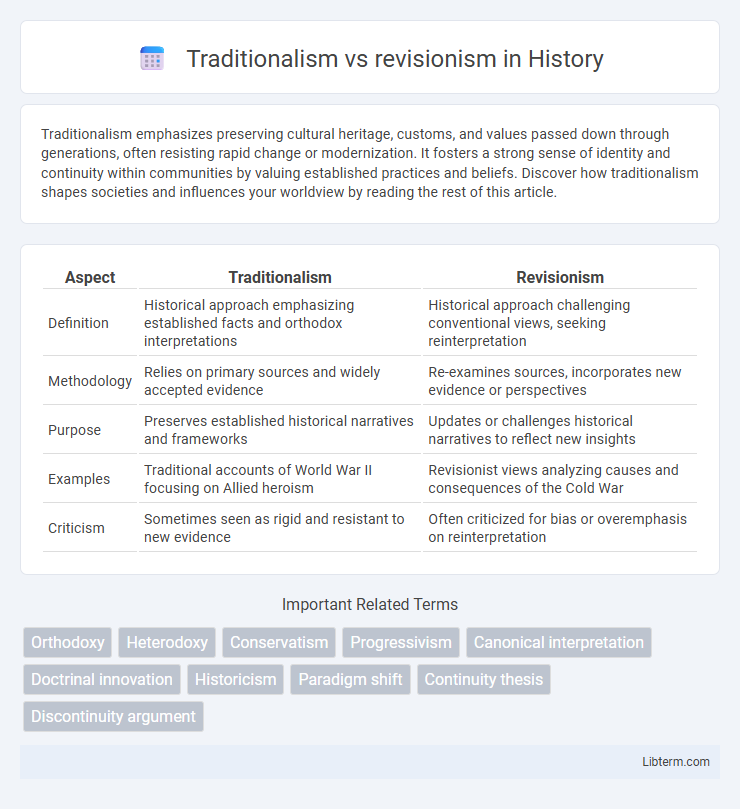Traditionalism emphasizes preserving cultural heritage, customs, and values passed down through generations, often resisting rapid change or modernization. It fosters a strong sense of identity and continuity within communities by valuing established practices and beliefs. Discover how traditionalism shapes societies and influences your worldview by reading the rest of this article.
Table of Comparison
| Aspect | Traditionalism | Revisionism |
|---|---|---|
| Definition | Historical approach emphasizing established facts and orthodox interpretations | Historical approach challenging conventional views, seeking reinterpretation |
| Methodology | Relies on primary sources and widely accepted evidence | Re-examines sources, incorporates new evidence or perspectives |
| Purpose | Preserves established historical narratives and frameworks | Updates or challenges historical narratives to reflect new insights |
| Examples | Traditional accounts of World War II focusing on Allied heroism | Revisionist views analyzing causes and consequences of the Cold War |
| Criticism | Sometimes seen as rigid and resistant to new evidence | Often criticized for bias or overemphasis on reinterpretation |
Understanding Traditionalism and Revisionism
Traditionalism emphasizes preserving historical interpretations and established doctrines, prioritizing continuity with foundational principles and longstanding practices. Revisionism challenges these orthodox views by re-evaluating evidence and offering new perspectives that often contest accepted narratives, seeking to update or amend prior conclusions. Both approaches shape scholarly discourse by balancing respect for historical context with the need for critical re-examination.
Historical Roots of the Debate
Traditionalism in historiography emphasizes the established interpretations and reliance on primary sources to preserve historical accuracy, rooted in 19th-century scholarship aiming to safeguard national identity. Revisionism challenges these accepted narratives by re-examining evidence and incorporating new perspectives, often arising from socio-political changes and critical theory developments in the 20th century. This debate traces back to conflicting priorities between conserving historical continuity and embracing reinterpretation driven by emerging methodologies and ideologies.
Key Philosophies and Principles
Traditionalism emphasizes the preservation of established customs, core values, and long-standing social structures, advocating for continuity and stability within societies. Revisionism challenges orthodox interpretations, promoting re-evaluation and adaptation of historical narratives and policies to reflect contemporary understandings and evidence. Both philosophies engage in critical debates over historiography, cultural identity, and political legitimacy, shaping discourse in history, international relations, and cultural studies.
Major Figures and Their Perspectives
Traditionalism emphasizes the established narratives of the Cold War, with figures like John Lewis Gaddis portraying the Soviet Union as the primary aggressor threatening global security. Revisionism challenges this view, with historians such as William Appleman Williams arguing that U.S. economic and political interests drove aggressive foreign policies, contributing to the conflict's escalation. Post-revisionists, led by scholars like Melvyn Leffler, seek a balanced perspective, acknowledging complexities and shared responsibilities between both superpowers.
Case Studies: Traditionalism in Practice
Traditionalism in practice is exemplified by prominent case studies such as the Atlantic Charter negotiations during World War II, where conservative interpretations upheld established diplomatic protocols and alliances. The approach prioritizes adherence to historical precedents and established doctrines, emphasizing continuity and stability in policy implementation. This contrasts with revisionist perspectives that advocate for reassessment and change based on emerging geopolitical realities.
The Rise of Revisionist Thought
The rise of revisionist thought in historiography challenged traditionalism by emphasizing the re-examination of established narratives using newly uncovered evidence and alternative perspectives. Revisionists questioned previously accepted interpretations of events such as wars, social movements, and political decisions, focusing on overlooked factors and marginalized voices. This shift led to more nuanced historical analyses that highlighted complexity over consensus, reshaping modern understanding of history.
Cultural Impacts of the Dichotomy
Traditionalism emphasizes the preservation of established cultural norms and values, reinforcing social cohesion through continuity and respect for heritage. Revisionism challenges these conventions by promoting reinterpretation and adaptation to contemporary realities, often sparking debates on identity and cultural authenticity. The tension between these perspectives shapes cultural evolution, influencing education, art, and collective memory across societies.
Political and Social Implications
Traditionalism emphasizes preserving established political institutions and social norms, advocating for gradual change to maintain stability and cultural continuity. Revisionism challenges these established ideas, promoting reforms to address social inequalities and adapt political structures to contemporary realities. The political implications include debates over governance models, while socially, these views influence policies on education, civil rights, and societal roles.
Critiques and Controversies
Traditionalism in historiography faces criticism for its rigid adherence to established narratives that may overlook marginalized perspectives and evolving evidence. Revisionism challenges conventional interpretations but attracts controversy for sometimes allegedly distorting facts to serve political or ideological agendas. Both approaches evoke debates over objectivity, historical accuracy, and the role of bias in shaping historical understanding.
Navigating the Future: Synthesis and Reconciliation
Traditionalism emphasizes preserving established historical narratives and values, while revisionism seeks to reinterpret and update those narratives in light of new evidence or perspectives. Navigating the future requires a synthesis that respects foundational principles yet remains open to critical reassessment, fostering a balanced understanding of history. Reconciliation between these approaches can promote a dynamic discourse that integrates continuity with innovation, enriching cultural and academic frameworks.
Traditionalism Infographic

 libterm.com
libterm.com